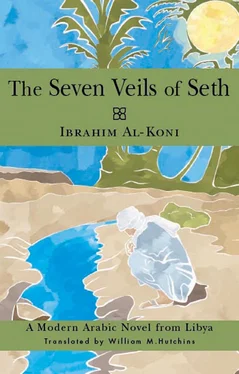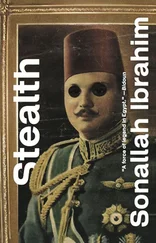The pervasive silence was broken only by the distant chirring of grasshoppers. With his fingers he traced lines in the mound’s dirt, which was mixed with the powdered bones of the dead. Then he said, “You didn’t err, because you speak of the law of those who lead a normal life. I cannot recognize, however, the customary laws of strangers, because I don’t live their life.”
“A man who lives with other people does not have the right to scorn their law. Do you know why?” Without waiting for an answer, he quickly supplied one: “Because he can’t do without other people.”
The second man retorted self-confidently, “Not so fast! Not so fast! We truly can’t do without other people when we acknowledge our membership in their community. Even so, I cannot surrender my affairs to them or allow them to reduce me to being just a man like any other.”
“What do you mean?”
With even greater self-assurance he continued, “For us to convey the truth to the people, we must refuse to live like the people. For us to save the people, we must keep our distance from them.”
“But people are children at times and wretches at others. How does it harm us to beguile them by hearing their complaints? What harm does it do us to respond to their weakness by accepting their offerings? What harm does it do us to humor them by sharing their amusements?”
His companion stubbornly rejected this argument: “If we keep pace with them, they will draw us down to their world. If we pretend to approve of their games, they will multiply their foolishness, assuming that we share their passion. If we cede an inch to them, we will lose our selves and become one of them for ever.”
“But you will never set the people’s minds at rest unless you reveal your intentions to them.”
A cry of protest escaped from the other man: “I should reveal my intentions to them? How can I reveal my intentions to them when I realize that by so doing I will lose not only my intentions but my prophetic maxims as well? I will lose not only my maxims but my self.”
He struck the earth twice with his staff and released a lengthy moan of longing, as if he — like others of the desert’s sages — was lamenting something that had died long ago. Rearing his head high — as if to address the heavens, which were strewn with the evening’s stars — he said: “This is the calamity of prophetic messengers. I swear by the supreme goddess Tanit that this is the way prophetic messengers speak. If messengers were lenient with people, hands would be raised to stone them.” Then, turning toward the other man, he asked inscrutably, “Are you a prophet?”
His companion replied immediately, “All of us are prophets. Anyone with a will is a messenger.”
Then his throat rattled with laughter, a prolonged laugh. Partially checked, it was sly and unwarranted.
When he returned after midnight from prowling through the orchards of the southern fields he found the diviner standing near his door. The ghostly diviner stood erect, facing the mausoleum as if praying. He was dressed entirely in black, from the cloth of his turban to the sandals concealing his feet. In the darkness he appeared a true shadow, a jinni shade. Although darkness and his veil disguised the visitor, out of the whole lot, he was the only creature the stranger could not mistake. So he decided to tease him: “Doesn’t the Law’s representative fear possible violence from the spirit world’s inhabitants when he loiters among the graves late at night?”
The specter immediately parried this jest: “Is there any place in our whole desert more appropriate for a representative of the Law than the ancestors’ tombs or the solitary countryside?”
“I’m delighted to hear that prophecy’s champion approves of cemeteries and deserted wastelands.”
“If an advocate of prophetic counsel avoided solitary open spaces, he would be forced to seek refuge from stupidity in lethargy, which slays the heart.” He continued, “What we do not attain by the spirit’s journeys, we won’t attain by the body’s. We cannot provide the nomad anything he has not himself attained, as you well understand.”
The jenny master puffed out fiery breaths. He had apparently decided to terminate the debate, for he invited his guest to sit with him. They crouched down, facing each other, however, as if their hostilities were destined to continue.
The jenny master said, “I understand you, but the Law does not. You practitioners of the Law are the first to betray it. By blowing the spirit’s riddle out of proportion you’ve caused us to forget the body’s existence. You have made the spirit such a master that we feel certain we are an incorporeal spirit. You’ve caused us to forget that we possess nothing in this world besides the body, which we are destined to carry about — just as it carries us about — because we know we’ll lose everything in the deal if we denigrate it. Our concern for the riddle you all call the ‘spirit’ is secondary to our concern for this sacred trust that generations have told us is perfected only by nomadism and ruined only by sedentary life.”
“I actually didn’t come to debate the relative merits of spirit and body.”
“Have you also come to invite me to drink from your tainted waters?”
“No, I’ve come to invite you to sip the earth’s water, which originates with heavens’ water.”
“Only the desert’s water is heavenly. The water in the oasis is surface run-off. Don’t try to tell me otherwise.”
“You have settled as a guest in our community, and all we want is to receive the guest as specified by the maxims of the Law, which states that a guest is always a messenger who bears glad tidings to people — without twisting your arm to honor us by embracing our customary law or by becoming one of us.”
“But what does the messenger of glad tidings do when he considers the people’s invitation a threat to the glad tidings?”
“I’m sad to hear this.”
“I’m sad too, but the law of hospitality is less binding than the law of glad tidings.”
Silence reigned.
An owl hooted in the orchards of a southern field.
PART I Section 4: The Others
On the way to the market he traversed alleyways blanketed in grey dust. In the late morning’s light, chips of ancient bones glittered like gold dust scattered across the earth. Other narrow trails crossed his route, some descending and some leading to higher ground toward the peak of the mountain composed of graves of the dead and skulls of the ancestors. Near a section of the ancient, ruined city wall, he found remains of mud-brick buildings that had collapsed, leaving only depressing debris to inspire grief and to awaken the certainty that anything that rises from the earth will crumble and sink back into the dirt one day, becoming part of the soil, constituting the true nature of this earth over which creep the arrogant shades who call themselves human beings. Here are the remnants of the wall that sheltered man one day. Here are the ashes of the hearth that fed man one day. Here are the shards of crockery that were the vessels of the dwelling’s master one day. Here are pieces of bone studded with mysterious pearls that glow in the light with the allure of inscrutability. These are all that remain of the master who once tyrannized the home. How comical it is that the house’s master should be routed and annihilated, while his utensils linger on as the sole evidence that he ever existed. Is the utensil stronger than the owner and longer-lived? The person who trampled others underfoot, who spilled blood, and who tread the earth with all the superiority of one eternally immortal has disappeared like a mirage, leaving an earthenware shard as the only evidence of his existence.
Читать дальше












